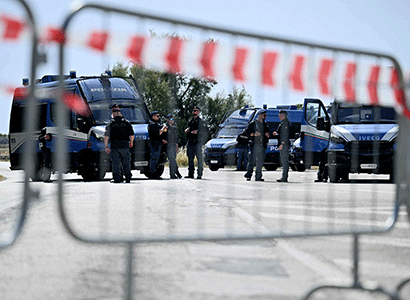‘Overcapacity’ hype reflects G7’s anxiety, lack of confidence
(Global Times) -- Group of Seven (G7) leaders held a final day of talks at their annual summit on Friday in the southern Italian region of Puglia, with discussion of China’s “overcapacity” reportedly topping the agenda. Chinese experts said this reflected G7 countries’ anxiety and fear over their weakness in the international competition across new industries, and they are attempting to label China’s advantageous industries as having “overcapacity” to curb the country’s development.
 |
| Police vehicles close a road in the red zone around Borgo Egnazia which will host the G7 summit. |
This year’s G7 summit was mocked by some Western media as a weak summit, as G7 leaders were mired in deep domestic power struggles. Moreover, the growing divergencies toward China have also made G7 more divided than ever.
Fair trade with China, notably on green technology, will be discussed by US President Joe Biden and the leaders of Japan, France, Germany, Italy, Canada and Britain, AFP reported. “G7 countries are on the same page vis-a-vis China,” a Japanese government source told AFP.
The meeting in Italy criticised China’s “harmful” industrial “overcapacity,” according to a draft statement seen by AFP Friday.
The meeting comes amid souring trade relations between China and the West, exemplified by the European Union’s announcement this week of a plan to impose new tariffs on Chinese electric vehicles.
Some Western countries’ claims of so-called “industrial overcapacity” in China’s new energy sectors such as electric vehicles (EVs), solar panels and lithium batteries are fabrications, He Weiwen, a senior fellow from the Centre for China and Globalisation, told the Global Times on Friday.
Thanks to China’s advantages such as large-scale manufacturing and complete industrial and supply chains, China’s EV industry leads the world.
The G7 countries’ “overcapacity” narrative is driven by their anxiety and fear over their weakness in the international competition across new industries, showing their lack of confidence, and they are attempting to label China’s advantageous industries as having “overcapacity” to curb the country’s development, He said.
Following the US’ footsteps, the European Commission has announced a decision to impose additional provisional tariffs on Chinese battery EVs imports. However, the G7 itself is divided in its trade policies toward China. For example, Germany is competitive in emerging industries and has many mutual investments with China and is therefore less inclined to impose tariffs on Chinese EVs, He said.
“China has multiple countermeasures, but how China responds will depend on what would be the most beneficial option for us,” He said.
According to industry insiders, China is internally moving ahead with the procedure to raise the temporary tariff rate on imported cars with large-displacement engines, Yuyuantantian, a social media account under China Media Group, reported on Thursday.
A Chinese auto industry insider has previously told the Global Times that China should consider raising the temporary tariff rate on imported cars with engines larger than 2.5 litres, and said China’s temporary tariff rate on imported vehicles could be raised to a maximum of 25 percent. The insider said that such a move would be not only in line with WTO rules, but also in line with China’s broader efforts to promote the green transition in the auto industry and pursue the goal of reducing carbon emissions.
The EU exports US$18 billion worth of cars with large-displacement engines to China each year, higher than the value of EVs China exported to the EU in 2023.
The US’ vehement call for G7 to act in coordination against China’s trade policies shows that Washington’s foreign policy of decoupling from and cracking down on China is fundamentally unchanged, Liu Weidong, a research fellow at the Institute of American Studies at the Chinese Academy of Social Sciences, told the Global Times on Friday.
Liu said that as the US’ previous export restrictions and crackdown on Chinese high-tech industries are ineffective, it is now focusing on China’s green industry.
(Latest Update June 14, 2024)
|